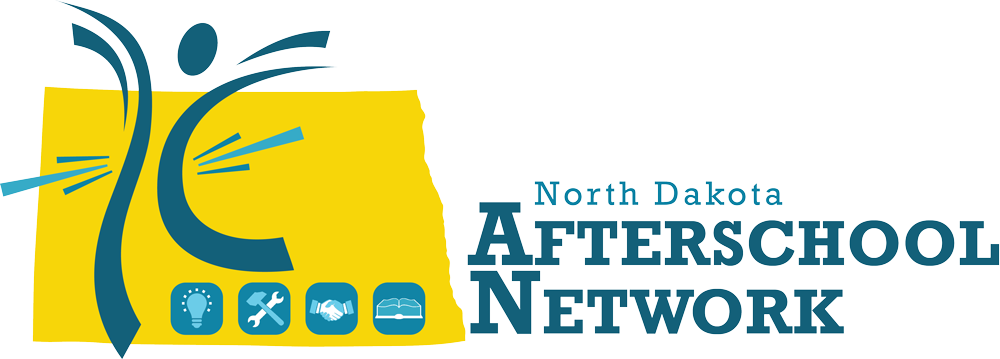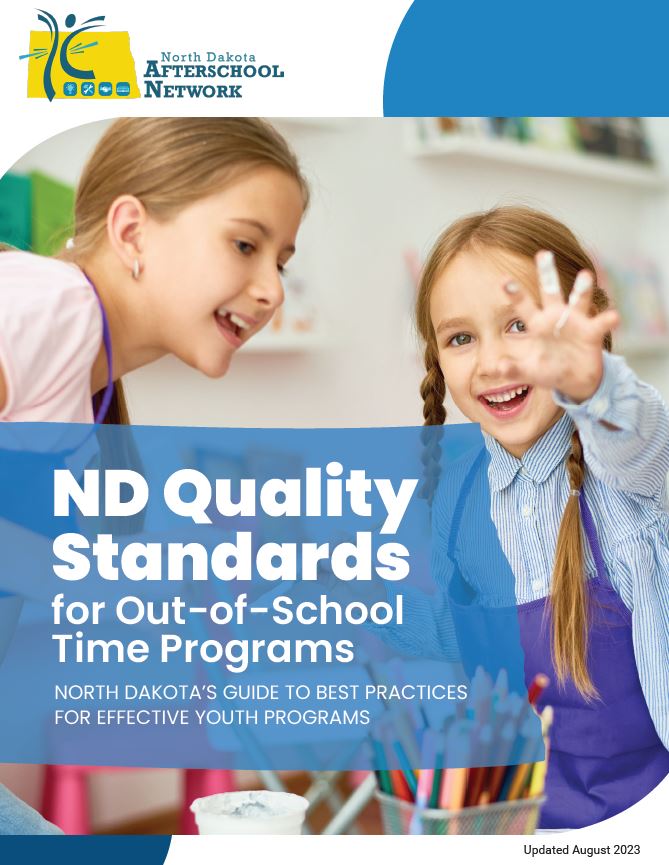Quality Standards
Quality Standards
The ND Quality Standards for OST Programs were updated in July 2023.
Access the 2024 – 2025 User Guide – Quality Standards for detailed guidance on how to use the standards and complete a program self-assessment.
21st Century Community Learning Center Grantees:
Submit August 15 – October 31, 2024: ND Quality Standards Self-Assessment Results
Submit March 15 – April 30, 2025: Goal Report: ND Quality Standards
Step 1. Get to Know the Quality Standards
ND Quality Standards for OST Programs are grouped into 4 Domains:
DOMAIN 1: HEALTH & SAFETY
We’ve all heard the phrase “safety first.” That applies to afterschool and summer learning programs, too. To learn, grow and thrive, youth need a space that is safe and promotes their well-being. Same goes for youth workers and program staff – we need to keep them safe, too.
DOMAIN 2: RELATIONSHIPS & INTERACTIONS
When programs create an environment that is truly welcoming for all – youth, families, staff, and visitors – and when relationships are deep and authentic, we’re best poised to meet students’ needs. Being intentional about our relationships and interactions will foster a safe, nurturing setting where youth can try new things, get extra support, and be inspired to be their best selves.
DOMAIN 3: YOUTH-CENTERED PROGRAM DESIGN
We know our programs aren’t something we do “to” or “for” youth, but rather with youth. Add in a high-quality learning environment plus program activities that speak directly to students’ needs and you’ve got the recipe for a program that really accelerates young people’s academic, social, and emotional learning.
DOMAIN 4: LEADERSHIP & MANAGEMENT
An effective program starts with a strong foundation. It’s easy to get caught up in meeting the day-to-day needs of youth and forget to look inward on a regular basis. When our administrative practices are solid, and our staff is well supported, our programs are better prepared to help students thrive.
Step 2. Get to Know the Self-Assessment
Access the 2024 – 2025 Quality Standards for OST Programs User Guide
All indicators in the Health & Safety domain have a “yes” or “no” self-assessment rating option.
The ND Quality Standards for Out-of-School Time Programs provide guidance on rating your program a 1, 2, 3, or 4 in the other 3 Domains (Relationships & Interactions, Youth-Centered Program Design, Leadership & Management). Additionally, each indicator now contains specific examples of evidence for a rating of 3.
Step 3. Select Your Review Team
Select your Self-Assessment Review Team.
Include at least 3 to 5 stakeholders as part of your Program Self-Assessment Review Team at each program site. Each person will bring their own knowledge and experience. It is ok if a team member only has strong knowledge of a certain domain. Consider including stakeholders from the following groups:
- Program Site Staff
- School Day Teachers
- Organization Administration
- School Administration
- Community/Business Partner
- Parents/Guardians
- Program Volunteers
- Youth/Participants
Step 4. Complete & Submit Program Self-Assessment & Goal Setting Template
- Complete the Self-Assessment at the beginning of each program/school year (August 15 – October 31, 2024).
- Select two indicators to work on throughout the program year. ND Quality Standards Goal Setting Template
3. Submit progress on your 2 quality indicators toward the end of the program year (March 15 – April 30, 2025). Follow-Up ND Quality Standards Goal Report Template
Submit Follow-Up ND Quality Standards Goal Report here. (March 15 – April 30, 2025)
Resources Aligned with Quality Standards
Access resources including information, tools, and templates aligned with each of the four Quality Domains:
- Health & Safety
- Relationships & Interactions
- Youth-Centered Program Design
- Leadership & Management
Contact the Network if you are looking for additional resources, tools, or trainings.
Are you a ND 21CCLC Program? Find Grant Requirements Here
ND 21st CCLC has adopted the ND Quality Standards for Out-of-School Time Programs for the 2022-2025 school years. The ND Quality Standards for Out-of-School Time Program Self-Assessment is intended for each 21st CCLC program to engage in a thoughtful review of program quality with stakeholders. A continuous quality improvement process will assist with goal setting and planning for future programming.
Each 21CCLC program site* will submit the Self-Assessment at the beginning of the program year (August 15 – October 31, 2024). Each 21CCLC program site will select two indicators to focus on for the program year and submit their selected indicators with their self-assessment results. Program sites will submit progress on the indicator(s) they selected toward the end of the program year (March 15 – April 30, 2025).
NDDPI 21st CCLC Grantee Program Information


